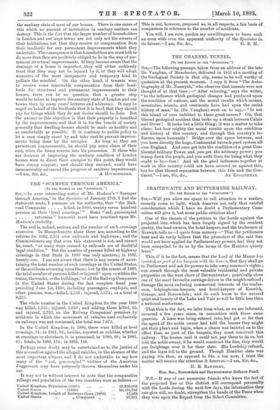COMPENSATION FOR PERMANENT IMPROVEMENTS IN TOWNS AND SANITARY IMPROVEMENTS.
[To THE EDITOR OF TILE " SPECTATOR."1
SIR,—The annual reports of the two Sanitary Associations established in London have shown us pretty plainly how bad is
the sanitary state of most of our houses. There is one cause of this which no amount of instruction in sanitary matters can destroy. This is the fact that the larger number of householders in London and our large towns are not only not the owners of their habitations, but that they receive no compensation from their landlords for any permanent improvements which they undertake. The consequence is that householders are most loth to do more than they are positively obliged to do in the way of per- manent structural improvements. If they become aware that the drainage of a house is imperfect, they will either recklessly trust that they may not be injured by it, or they will adopt measures of the most inexpensive and temporary kind to palliate the mischief. On the other hand, if tenants were to receive some reasonable compensation from their land- lords for structural and permanent improvements to their houses, there can be no question that a greater step would be taken to improve the sanitary state of London and our towns than by many years' lectures and addresses. It may be urged on behalf of the landlords that it is hard that they should pay for things which they do not desire should be done. But the answer to this objection is that their property is benefited by the improvements, and that it is for the benefit of society generally that dwelling-houses should be made as healthy and as comfortable as possible. It is contrary to public policy to let a man simply stand by and take rent to prevent improve- ments being done by the occupier. As long as they are permanent improvements, he should pay some share of their cost, when the house reverts into his possession. If those who are desirous of improving the sanitary condition of London houses were to direct their energies to this point, they would have strong support; and should they succeed, would have immeasurably advanced the progress of sanitary improvement.



































 Previous page
Previous page